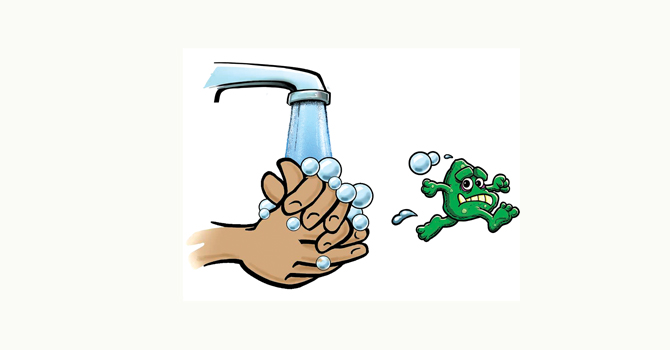33 per cent of urban people lack access to soap and water in Nepal: UNICEF

Handwashing with soap, when done correctly, is critical in the fight against the novel coronavirus disease (COVID-19), but millions of people have no ready access to a place to wash their hands, UNICEF said today.
In total, only 3 out of 5 people worldwide have basic handwashing facilities, according to the latest data. In Nepal, more than half of the population do not have access to handwashing with soap and water at households.
“Handwashing with soap is one of the cheapest, most effective things you can do to protect yourself and others against coronavirus, as well as many other infectious diseases. Yet for billions, even this most basic of steps is simply out of reach.” said Sanjay Wijesekera, UNICEF Director of Programmes.
“It is far from a magic bullet. But it is important to make sure people know what steps they should take to keep themselves and their families safe, even as we continue our longstanding efforts to make basic hygiene and sanitation available to everyone.”
According to the latest estimates, 40 per cent of the world’s population, or 3 billion people, do not have a handwashing facility with water and soap at home. Nearly three quarters of the people in least developed countries lack basic hand washing facilities at home. 47 per cent of schools lacked a handwashing facility with water and soap affecting 900 million school-age children.
In Nepal, 54 per cent health care facilities have no access to handwashing facilities at point of care. Availability of disinfectant at outpatient departments of health care facilities is only 59 per cent while availability of water in delivery rooms at health care facilities is 69 per cent Urban populations are particularly at risk of viral respiratory infections due to population density and more frequent public gatherings in crowded spaces like markets, public transport or places of worship.
In Nepal, 33 per cent of urban population or around 3 in 10 people do not have access to handwashing with soap and water.
Handwashing is also key to protect health workers from infection and prevent the spread of COVID-19 and other infections in healthcare facilities. As the coronavirus response takes its toll on the health services in the affected countries, the practice of handwashing with soap is even more important in warding off common respiratory and diarrhoeal diseases.
UNICEF works around the world to ensure children and their parents have access to appropriate handwashing facilities. Additionally, UNICEF promotes handwashing in over 90 countries, working with governments to develop handwashing policies, strategies and action plans. We also support national handwashing campaigns, including through mass media, through work with community health and outreach workers to make sure they promote handwashing, and through work with schools and teachers to teach children the importance of handwashing.
Recent News

Do not make expressions casting dout on election: EC
14 Apr, 2022
CM Bhatta says may New Year 2079 BS inspire positive thinking
14 Apr, 2022
Three new cases, 44 recoveries in 24 hours
14 Apr, 2022
689 climbers of 84 teams so far acquire permits for climbing various peaks this spring season
14 Apr, 2022
How the rising cost of living crisis is impacting Nepal
14 Apr, 2022
US military confirms an interstellar meteor collided with Earth
14 Apr, 2022
Valneva Covid vaccine approved for use in UK
14 Apr, 2022
Chair Prachanda highlights need of unity among Maoist, Communist forces
14 Apr, 2022
Ranbir Kapoor and Alia Bhatt: Bollywood toasts star couple on wedding
14 Apr, 2022
President Bhandari confers decorations (Photo Feature)
14 Apr, 2022











